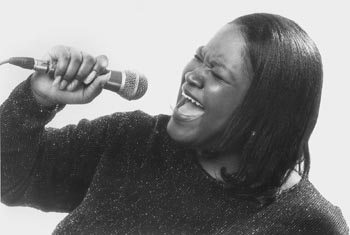![[Metroactive Music]](/music/gifs/music468.gif)
[ Music Index | Metro | Metroactive Central | Archives ]
With the Heat Up
 Her Turn: Shemekia Copeland approaches an old genre with a new outlook. Johnny Copeland's daughter, Shemekia, follows the family's blues tradition By Nicky Baxter FOR YEARS, blues fans and pundits have been fretting over the dearth of good young black female blues singers. Outside of, say, singer/guitarist Deborah Coleman and a scant few others, there have been no real threats to the position currently occupied by blues queen Koko Taylor. Enter Shemekia Copeland. Though Copeland is just 19 years old, she has already caught the ears of blues lovers and critics. She is even being touted as the future of the blues. Idle talk? Maybe not. Her debut album, Turn the Heat Up (Alligator), topped the charts of Living Blues magazine for much of last summer. Copeland is a powerhouse of a singer, possessing the kind of vocal equipment women twice her age would die for. Her approach to the blues is refreshingly broad-minded, stitching together elements of Stax soul, hard-driving R&B and gospel. Just as impressive is Copeland's emotional range. From a shushed whisper to an inferno-like roar, she covers all the bases with precocious aplomb. On songs like "I Always Get My Man," and "Big Lovin' Woman," Shemekia is in total command, coming on with the brash swagger of a woman used to having her way. On the rollicking "My Turn, Baby" Copeland spars with blues veteran Joe Louis Walker and holds her own. On "Salt in My Wounds" and "Ghetto Child," Copeland displays a firm grasp of midnight-hour blues, testifying like a preacher woman, one moment seething, and hissing like the devil's daughter the next. If it's true that Shemekia's gifts are God-given, some credit must also be given to her father, the late bluesman Johnny Copeland, for spotting them. "My dad knew I was going to be a singer even before I did," she avers in a phone conversation from her home in Teaneck, N.J. "He brought me along slowly, letting me get used to the spotlight." She remembers vividly her first onstage appearance with her dad at Harlem's Cotton Club when she was 8. "I was very nervous at first. Then I just started singing, and it felt like I was in my living room singing, with my daddy strumming guitar." Growing up on the tough streets of Harlem, Copeland was something of an anomaly. While baggy-pantsed types were bopping to the boom-bap of hip-hop, she was grooving to old-school sweet soul-stirrers like Sam Cooke and Sam & Dave. Copeland was also drawn to rock, the Beatles and the Stones being particular favorites. And of course there was the blues: Etta James, Koko Taylor have been enduring favorites. Johnny Copeland had always told his daughter she would someday feel the need to sing. His slowly declining health proved to be the spark for Shemekia. One day, when she was about 15, "just like that, a bell went off and I knew I had to sing," she declares, still sounding a little surprised. Though seriously ill, Johnny Copeland continued to perform, Shemekia in tow. More and more, she found herself assuming centerstage, filling in for her ailing father. More and more, she gained confidence both as a singer and as a performer. Apparently, that was the senior Copeland's plan all along. "He was so sick those last few years," she says softly. "He brought me along, I think, just so I could get more comfortable singing in front of people. He'd make it sound like I was doing it for him, but I knew it was for me." The 60-year-old Copeland would succumb to heart failure during the recording of Turn the Heat Up. Now that she's in the midst of a well-received national tour and with a brisk-selling album under her belt, Johnny Copeland would be proud of his baby girl. "His spirit is so strong, I never get onstage without him," Copeland affirms. "I think he's smiling down on me."
Shemekia Copeland performs Thursday (Feb. 11) at 9pm at JJ's Blues, 3439 Stevens Creek Blvd., San Jose. Tickets are $10/$8. (408.243.6441) [ San Jose | Metroactive Central | Archives ]
|
From the February 11-17, 1999 issue of Metro.
Copyright © Metro Publishing Inc. Maintained by Boulevards New Media.